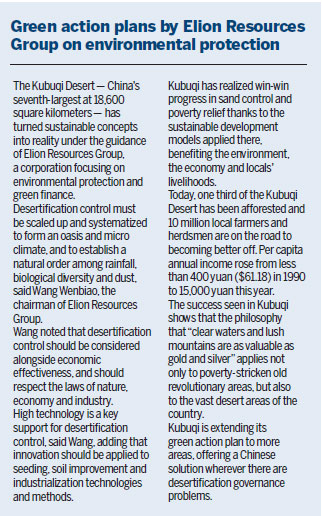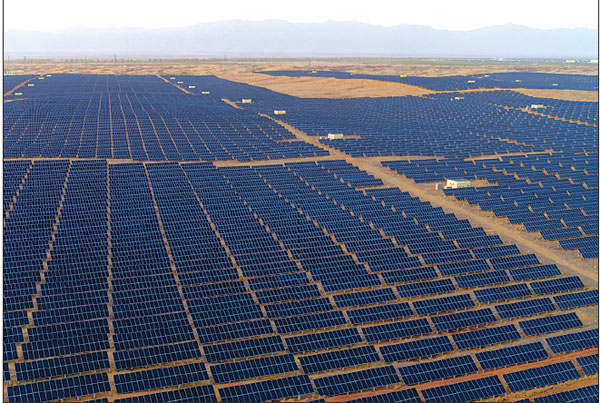Kubuqi Desert forum shares experiences in reclaiming the land
The sixth Kubuqi International Desert Forum shared China's experience in tackling desertification for the past 30 years, reiterating the importance of natural laws and green economic development.
The forum was held in the Kubuqi Desert in North China's Inner Mongolia autonomous region on July 29. The Kubuqi Desert is China's seventh-largest sand area, measuring 18,600 square kilometers.
The desert is one of the birthplaces of the sandstorms that can strike Beijing.
The straight distance from Beijing to Kubuqi is around 800 km, making it the nearest desert to Beijing.
The local people there modified their overall plan to combat desertification under the guidance of a systematic scientific and technological outlook. Now, the word "desert" has been redefined by desertification fighters.

Elion Resources Group, a green technology and finance company, has been part of the Kubuqi desertification-control project since 1988.
At the forum, the company shared its expertise in reclaiming land in desert regions by planting the Chinese herb licorice.
Licorice plants are drought tolerant and can grow on uncultivated land, making it a pioneer plant for optimizing desert soil properties.
The legume bacteria living around licorice plants' roots have a nitrogen fixation effect, increasing the soil's fertility.
One licorice plant can help to reclaim 0.1 square meter of desert.
In most circumstances, the plant grows upright toward the sky.
Elion innovated the planting method, making one licorice tree become capable of reclaiming 1 sq m of the land, 10 times more than before.
Besides planting licorice, the company also works together with local residents with the support of new technologies. The company has succeeded in reclaiming over 6,000 sq km of desert, mostly by planting desert-friendly plants.
Starting as a small company mining a salt field, Elion has invented more than 100 environmental technologies, as well as more than 100 technological solutions to improve the desert environment.
To date, Elion has invested more than 38 billion yuan ($5.82 billion) in improving the enrionvmental conditions in the desert.
The company's input has generated more than 500 billion yuan in environmental wealth. The whole project pulled 102,000 local farmers out of poverty.
"Only if we respect nature and observe its laws, can we transform the issue of desertification into opportunity. Thereafter, we can turn the fiscal burden caused by deserts into green GDP," said Wang Wenbiao, chairman of the company.
Thanks to the efforts made by local people, in today's Kubuqi, people can see flocks of sheep and cattle grazing under the solar panels; the panels feeding electricity into the national power grid; and the boundless, starry sky above the darkened desert, which attracts more and more visitors.
With the theme the Green Belt and Road Initiative, Sharing Desert Economy, the sixth forum is a practical response to the proposal that "green mountains and clear water are as good as mountains of gold and silver".
The replicable and practical experience represents a stimulating approach contributed by China to the global desertification control effort.
A senior Chinese official said in a congratulatory letter to the forum that China has always attached great importance to combating desertification and has made remarkable achievements. Kubuqi is a good example of China's success in containing desertification and China offers its experience to the international community, the official added.
The letter also noted that since its founding 10 years ago, the forum has become an important platform for nations to exchange their experience in combating desertification and achieving the United Nations 2030 Agenda for Sustainable Development.
The United Nations Convention to Combat Desertification - a binding international agreement on land issues - agreed that the land reclamation project in the Kubuqi Desert has set a good model for the rest of the world, creating a new way under the framework of marketization, industrialization and shared public benefits.
The road explored by Kubuqi locals aims to be a balanced solution to drive the sustainable development of sand-control, ecology, livelihood and economy.
The forum was sponsored by China's Ministry of Science and Technology, the State Forestry Administration, the Inner Mongolia People's Government, the United Nations Environment Programme and the Secretariat of the UN Convention to Combat Desertification.
China has about 2.6 million sq km of desert and another 1.7 million sq km of desertified land, which together is about a tenth of the world's total.
Thanks to the authorities' efforts, desert and desertified areas in China have on average been reduced by about 4,000 sq km annually in recent years.
liyou@chinadaily.com.cn
|
Capitalizing solar and thermal energies in the Kubuqi Desert, Elion develops an ecological photovoltaic industry. It integrates desertification control, power generation, plantations, animal husbandry and poverty alleviation.Provided To China Daily |
(China Daily 09/09/2017 page11)













